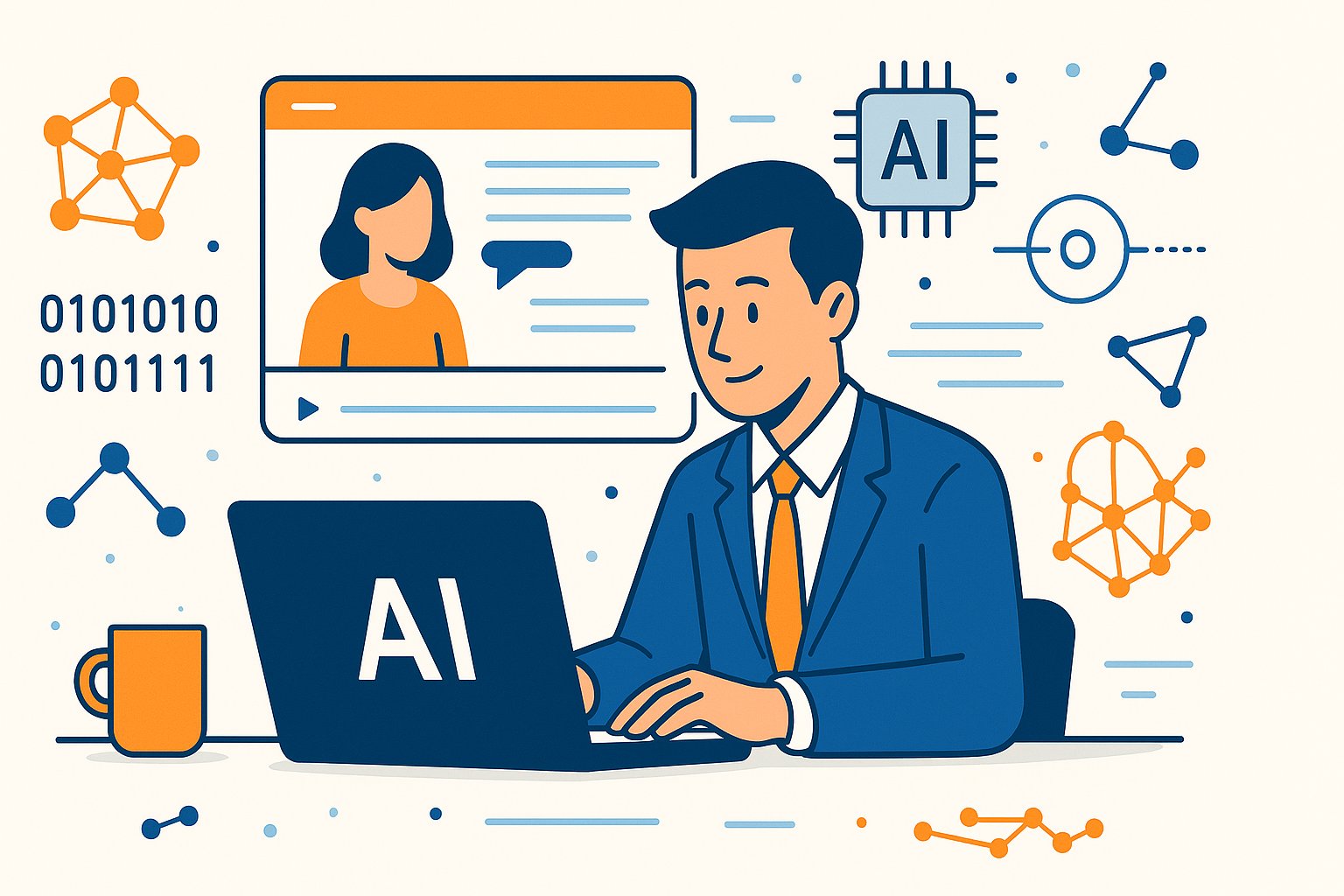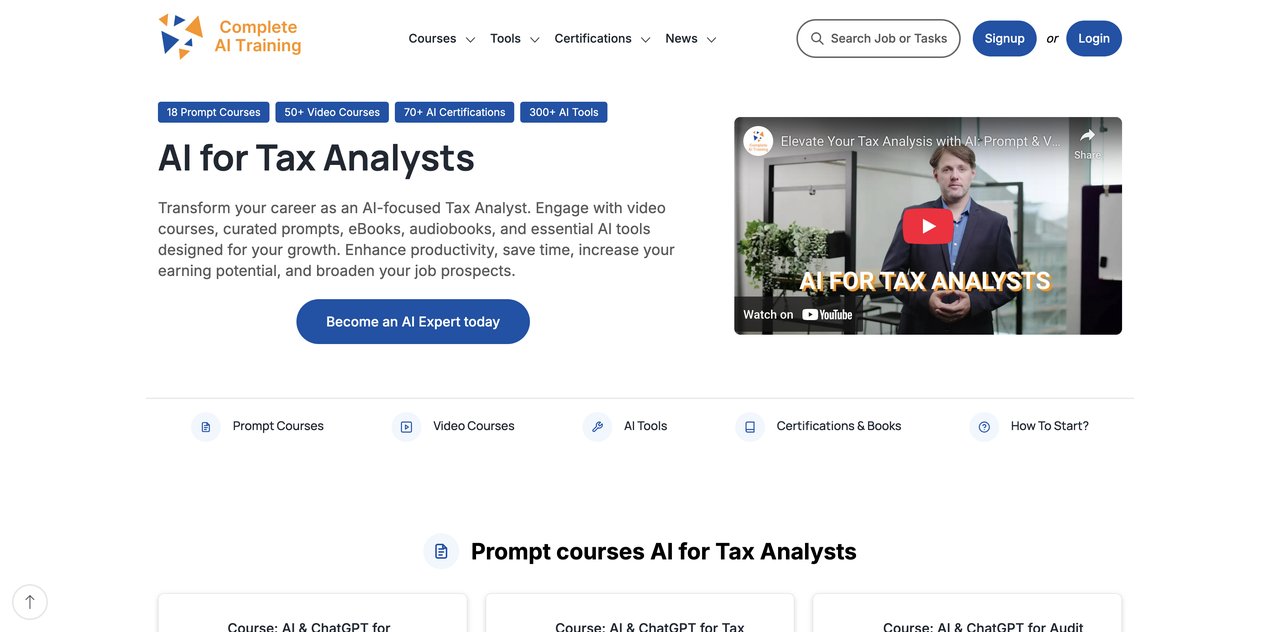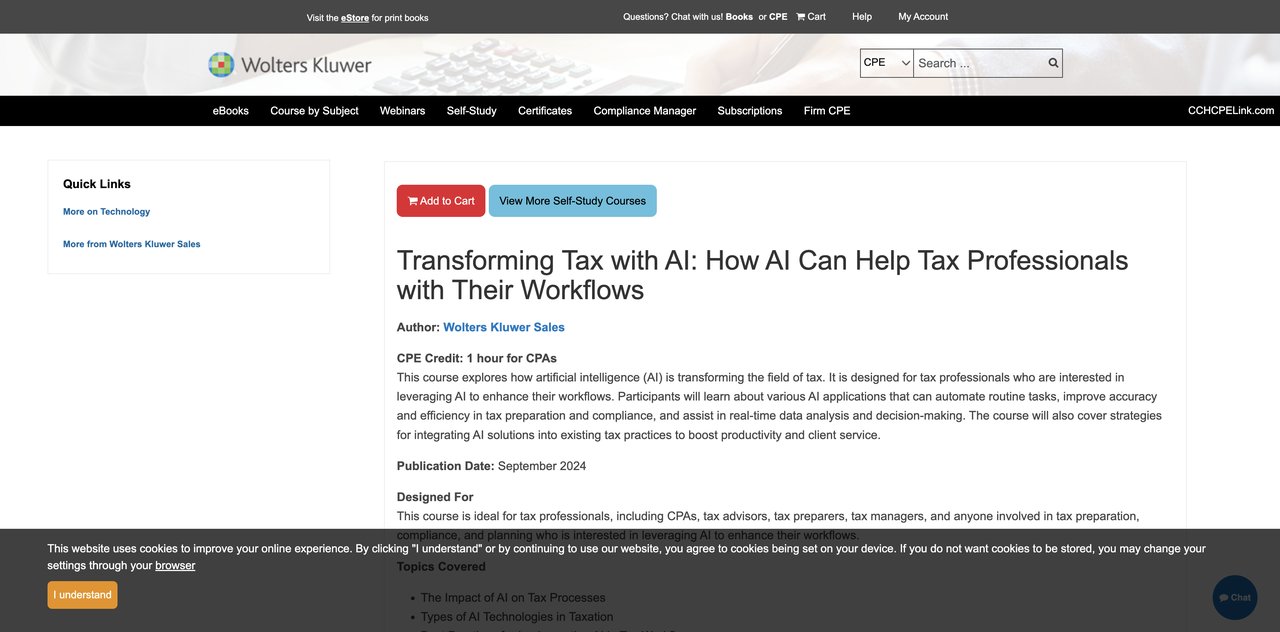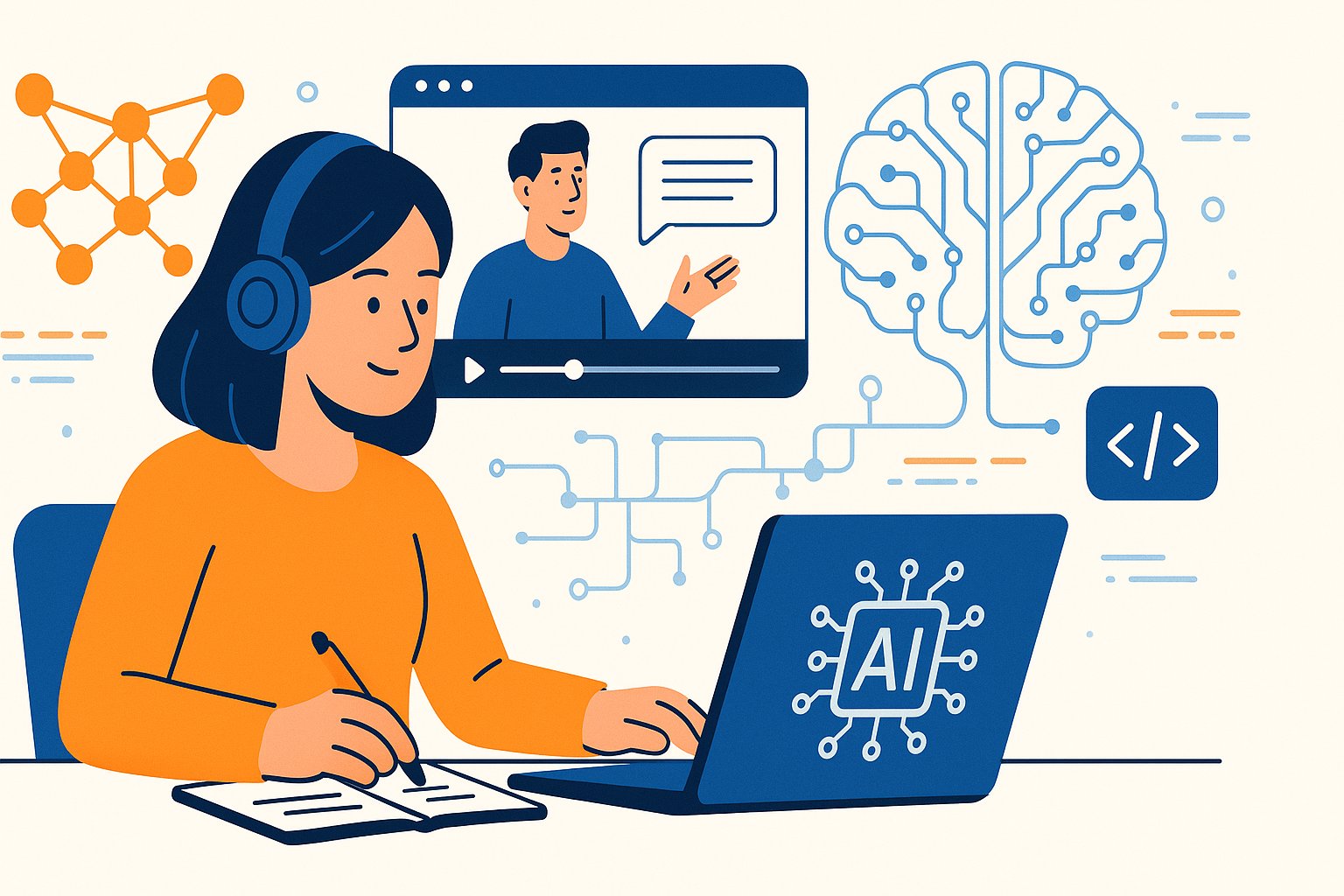19 Best AI Courses for Tax Analysts to Future-Proof Your Career in 2025
Discover top AI courses tailored for tax analysts, designed to enhance skills and secure your career in 2025. Gain insights into cutting-edge technologies and methodologies that will keep you ahead in the rapidly evolving financial landscape.

The rapid advancement of artificial intelligence (AI) is fundamentally altering various industries, and the field of tax analysis is no exception. As AI technologies continue to grow and evolve, the need for tax analysts to upskill and adapt becomes increasingly urgent. The integration of AI in taxation processes presents both opportunities and challenges, impacting job roles and the skills required for success. Tax analysts who proactively embrace AI can enhance their efficiency, accuracy, and career prospects in a competitive market.
Why AI matters for Tax Analysts today
AI is becoming a crucial tool for tax analysts, transforming how they approach data analysis and regulatory compliance. According to recent studies, 69% of businesses are already utilizing AI in various capacities, highlighting the widespread adoption of these technologies. This article aims to guide tax analysts in selecting the best AI courses to enhance their expertise and remain relevant in their field. By exploring specific courses tailored for tax professionals, this piece seeks to provide insights into how AI can be effectively integrated into their daily workflows.
The Growing Role of AI in Tax Analysts
AI is increasingly being applied in the tax analysis sector to automate routine tasks, support decision-making, and personalize client interactions. Automation through AI can significantly reduce the time spent on repetitive tasks, allowing tax analysts to focus on more strategic responsibilities. Decision-making processes are enhanced by AI's ability to analyze vast datasets quickly and accurately, providing valuable insights that inform better outcomes. Additionally, AI facilitates personalized approaches to client management, offering tailored solutions based on individual client data. These applications demonstrate how AI is reshaping the tasks and workflows within the tax analysis profession.
Benefits of becoming an AI expert in Tax Analysts
For tax analysts, becoming proficient in AI offers numerous benefits. Enhanced efficiency and accuracy in data analysis can lead to improved job performance and client satisfaction. AI expertise can also open up new career opportunities and pathways, as organizations increasingly seek professionals who can leverage AI technologies to drive business success. Furthermore, understanding AI can empower tax analysts to take on more strategic roles, contributing to innovation and continuous improvement within their organizations. As AI continues to integrate into the tax sector, those with advanced knowledge and skills in this area will likely find themselves at the forefront of industry developments.
This article will compare three notable AI courses in this field, including CompleteAI Training, AI for Taxation and Regulatory Compliance by CPA Australia, and Transforming Tax with AI by Wolters Kluwer. Each course offers unique insights and learning opportunities for tax analysts seeking to enhance their AI proficiency and stay ahead in their careers.

Comparison: All AI Courses for Tax Analysts (Updated Q2' 2025)
| Course Name | Provider | Price | Key Topics | Pros | Cons | Best For |
|---|---|---|---|---|---|---|
| AI for Tax Analysts (Video Courses + Certifications) | CompleteAI Training | $29/month or $8.25/month billed annually | Comprehensive AI education, AI tools updates, Industry news | Highest rating, Extensive course range, Daily updates, Affordable pricing | Subscription-based access | Tax Analysts professionals |
| AI & ChatGPT for Tax Trend Analysis (Updated 2025) | CompleteAI Training | Included with membership | Generative AI, Tax trend analysis, AI tools and techniques | Comprehensive coverage, Updated tools, Large library access | Membership required | General learners |
| AI & ChatGPT for Interpretation of Tax Codes (Updated 2025) | CompleteAI Training | Included with membership | AI for tax code interpretation, Automation of regulatory understanding | Tailored for tax code interpretation, Practical application | Familiarity with AI prompts required | General learners |
| AI & ChatGPT for Tax Calculation Assistance (Updated 2025) | CompleteAI Training | Included with membership | AI tools for tax calculations, Automation of computations | Practical for daily tasks, Beginner-friendly | Software integration may be needed | General learners |
| AI & ChatGPT for Audit Preparation Support (Updated 2025) | CompleteAI Training | Included with membership | AI for audit preparation, Document review automation | Streamlines audit preparation, Reduces manual workload | Focused on audit preparation only | General learners |
| AI & ChatGPT for Tax Software Utilization (Updated 2025) | CompleteAI Training | Included with membership | AI integration with tax software, Workflow efficiency | Practical software integration, Beginner level | Existing software licenses may be required | General learners |
| AI & ChatGPT for Tax Policy Analysis (Updated 2025) | CompleteAI Training | Included with membership | AI for policy analysis, Strategic insights | Enhances strategic analysis skills | Conceptual, requires analytical mindset | General learners |
| AI for Taxation and Regulatory Compliance (132591050) | CPA Australia | $100-$200 | AI technologies, Compliance monitoring, Tax research | Tailored for tax professionals, Recognized CPD hours | Price not explicitly stated, Membership may be required | General learners |
| Transforming Tax with AI: How AI Can Help Tax Professionals with Their Workflows | Wolters Kluwer | $55 | AI for task automation, Tax preparation, Compliance | Practical AI applications, CPE credit | Intermediate level, Prior AI knowledge may be required | General learners |
Understanding AI Training for Tax Analysts Professionals
Artificial intelligence (AI) is transforming various industries, and the field of tax analysis is no exception. Tax analysts are increasingly turning to AI tools to streamline processes, improve accuracy, and derive insights from complex data. To equip professionals with the necessary skills, several courses have been developed, each offering unique content and benefits. This article provides a detailed comparison of AI courses specifically designed for tax analysts.
Course 1: CompleteAI Training

CompleteAI Training offers an extensive library of over 100 specialized video courses and certifications tailored specifically for tax analysts. The platform provides daily updates on the latest AI tools and curated industry news relevant to tax professionals. With a subscription model, users gain access to a comprehensive AI education that evolves continuously with the industry.
Key Topics Covered: AI tools for tax analysis, trend analysis, tax code interpretation, calculation assistance, audit preparation, software utilization, policy analysis, international tax guidance, tax credits and deductions, compliance monitoring, and financial planning.
Target Audience and Skill Level: Geared towards tax analysts at all levels seeking to integrate AI into their practice. Beginner-friendly with resources for advanced learners.
- Pros:
- Extensive course library tailored for tax analysts
- Daily updates on AI tools and industry news
- Affordable pricing, especially with annual billing
- High user ratings
- Cons:
- Subscription-based model
Ideal For: Tax analysts looking for a comprehensive and affordable AI training solution with ongoing updates and certifications.
Course 2: AI for Taxation and Regulatory Compliance by CPA Australia

Offered by CPA Australia in partnership with Learnsignal, this course is designed for tax professionals, accountants, and compliance officers. It covers AI technologies such as Natural Language Processing (NLP) and Machine Learning (ML) to automate and optimize tax-related tasks, including compliance monitoring and advisory services.
Key Topics Covered: AI applications in tax compliance, monitoring, research, and advisory services.
Target Audience and Skill Level: Tailored for tax and compliance professionals seeking to enhance their understanding of AI's role in their field. Suitable for those with some prior knowledge of tax regulations.
- Pros:
- Recognized CPD hours
- Practical focus with real-world applications
- Self-paced online format
- Cons:
- Cost not explicitly stated, potential additional fees
- Completion deadline with no extension options
Ideal For: Tax professionals interested in integrating AI into regulatory compliance and advisory roles.
Course 3: Transforming Tax with AI by Wolters Kluwer

This intermediate-level self-study course from Wolters Kluwer teaches tax professionals how to leverage AI to automate routine tasks, improve accuracy, and enhance efficiency in tax preparation and compliance. It also supports real-time data analysis and decision-making.
Key Topics Covered: AI applications in tax workflows, automation of routine tasks, and real-time data analysis.
Target Audience and Skill Level: Designed for tax professionals with an intermediate understanding of AI, looking to incorporate AI into their daily workflows.
- Pros:
- Focus on practical AI applications
- Offers CPE credit
- Self-paced learning
- Cons:
- Requires prior AI knowledge
Ideal For: Tax professionals seeking to automate tasks and enhance workflow efficiency through AI.
Overall Recommendations
Choosing the right AI course for tax analysts depends on individual needs and career goals. For those seeking a comprehensive and affordable solution with continuous updates, CompleteAI Training is an excellent choice. It offers a wide array of courses and certifications tailored for tax professionals.
Alternatively, professionals focused on regulatory compliance may find value in the CPA Australia course, which provides practical knowledge and CPD credits. For those with an intermediate understanding of AI, the Wolters Kluwer course offers a practical approach to integrating AI into tax workflows.
Ultimately, tax analysts should consider their current skill level, budget, and specific areas of interest when selecting an AI course to enhance their professional capabilities.




